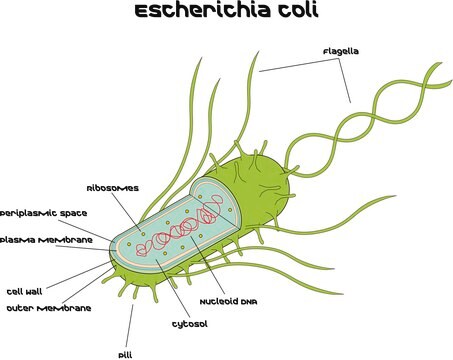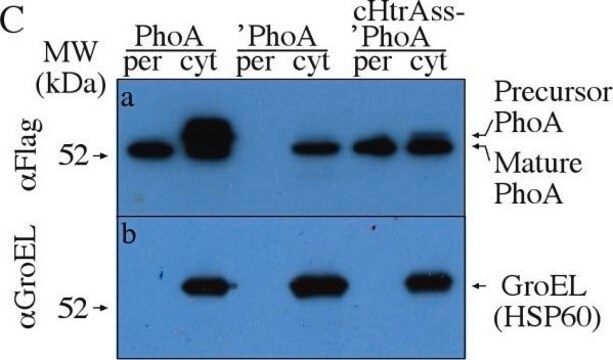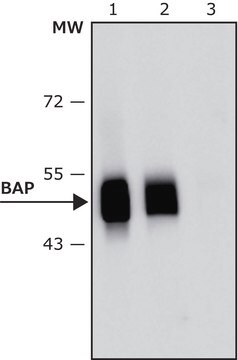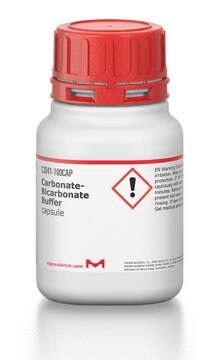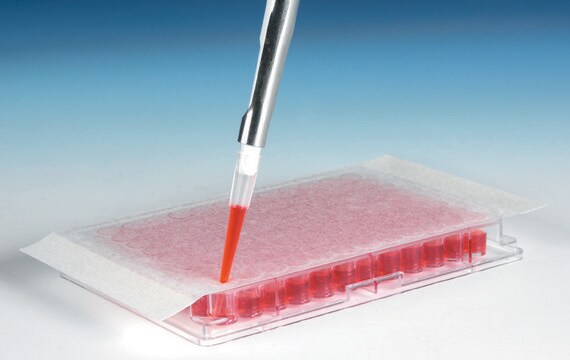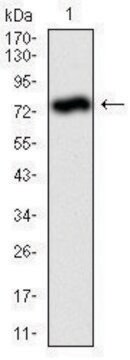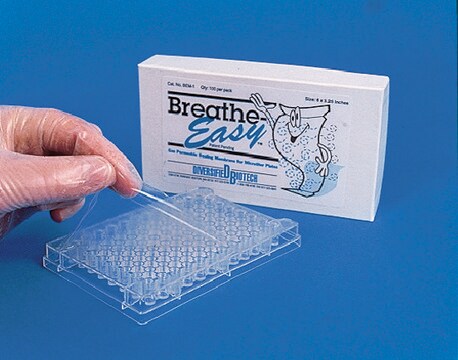MAB1012
Anti-Alkaline Phosphatase Antibody, E. coli, bacterial only
ascites fluid, Chemicon®
Synonim(y):
AP, Alk. Phos.
About This Item
Polecane produkty
pochodzenie biologiczne
mouse
Poziom jakości
forma przeciwciała
ascites fluid
rodzaj przeciwciała
primary antibodies
klon
monoclonal
reaktywność gatunkowa
E. coli
producent / nazwa handlowa
Chemicon®
metody
immunocytochemistry: suitable
immunoprecipitation (IP): suitable
western blot: suitable
izotyp
IgG2a
numer dostępu UniProt
Warunki transportu
dry ice
docelowa modyfikacja potranslacyjna
unmodified
informacje o genach
Escherichia coli ... PhoA(945041)
Specyficzność
Immunogen
Zastosowanie
Immunocytochemistry: reacts with E.coli. AP fusion protein targets in acetone fixed cell preparations. 1:4000, other fixatives or conditions untested.
ASSAY:
Preparation of E. coli TnphoA transformants: E. coli strain CC118 was transformed with plasmid pGEM-3Z containing TnphoA insertional mutations in the p101 gene of Mycoplasma hyorhinis, which encodes a protein with a typical N-terminal prokaryotic single peptide (Yogev et al. 1991).
Identification of fusion protein with MAB1012 transformants: Transformants are grown in 2XYT medium to OD600=0.6. Cells were centrifuged 3 minutes at 10,000 x g, suspended in SDS-PAGE sample buffer, heated at 100°C for 5 minutes, frozen and thawed and centrifuged as above at room temperature to remove insoluble material. The sample is applied at 9% to a SDS-PAGE gel, and Western immunoblot is performed as described (Yogev et al. 1991).
Immunoprecipitation: 5μL of antibody per 500μL of lysate in RIPA or 0.5% triton X-100 solutions.
Optimal working dilutions must be determined by end user.
Postać fizyczna
Informacje prawne
Nie możesz znaleźć właściwego produktu?
Wypróbuj nasz Narzędzie selektora produktów.
Kod klasy składowania
10 - Combustible liquids
Klasa zagrożenia wodnego (WGK)
WGK 1
Temperatura zapłonu (°F)
Not applicable
Temperatura zapłonu (°C)
Not applicable
Certyfikaty analizy (CoA)
Poszukaj Certyfikaty analizy (CoA), wpisując numer partii/serii produktów. Numery serii i partii można znaleźć na etykiecie produktu po słowach „seria” lub „partia”.
Masz już ten produkt?
Dokumenty związane z niedawno zakupionymi produktami zostały zamieszczone w Bibliotece dokumentów.
Nasz zespół naukowców ma doświadczenie we wszystkich obszarach badań, w tym w naukach przyrodniczych, materiałoznawstwie, syntezie chemicznej, chromatografii, analityce i wielu innych dziedzinach.
Skontaktuj się z zespołem ds. pomocy technicznej